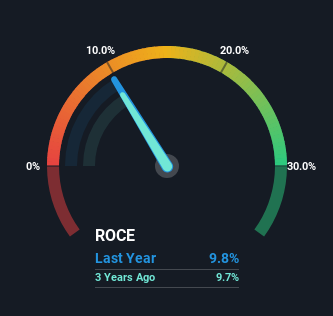Investors Met With Slowing Returns on Capital At Sanko Techno (TSE:3435)

If you're not sure where to start when looking for the next multi-bagger, there are a few key trends you should keep an eye out for. Typically, we'll want to notice a trend of growing return on capital employed (ROCE) and alongside that, an expanding base of capital employed. If you see this, it typically means it's a company with a great business model and plenty of profitable reinvestment opportunities. However, after investigating Sanko Techno (TSE:3435), we don't think it's current trends fit the mold of a multi-bagger.
What Is Return On Capital Employed (ROCE)?
For those who don't know, ROCE is a measure of a company's yearly pre-tax profit (its return), relative to the capital employed in the business. To calculate this metric for Sanko Techno, this is the formula:
Return on Capital Employed = Earnings Before Interest and Tax (EBIT) ÷ (Total Assets - Current Liabilities)
0.098 = JP¥2.1b ÷ (JP¥25b - JP¥3.5b) (Based on the trailing twelve months to March 2024).
So, Sanko Techno has an ROCE of 9.8%. On its own that's a low return, but compared to the average of 8.0% generated by the Machinery industry, it's much better.
Check out our latest analysis for Sanko Techno

Historical performance is a great place to start when researching a stock so above you can see the gauge for Sanko Techno's ROCE against it's prior returns. If you'd like to look at how Sanko Techno has performed in the past in other metrics, you can view this free graph of Sanko Techno's past earnings, revenue and cash flow.
How Are Returns Trending?
There are better returns on capital out there than what we're seeing at Sanko Techno. The company has employed 54% more capital in the last five years, and the returns on that capital have remained stable at 9.8%. Given the company has increased the amount of capital employed, it appears the investments that have been made simply don't provide a high return on capital.
The Bottom Line On Sanko Techno's ROCE
As we've seen above, Sanko Techno's returns on capital haven't increased but it is reinvesting in the business. And investors may be recognizing these trends since the stock has only returned a total of 38% to shareholders over the last five years. As a result, if you're hunting for a multi-bagger, we think you'd have more luck elsewhere.
One more thing to note, we've identified 2 warning signs with Sanko Techno and understanding these should be part of your investment process.
If you want to search for solid companies with great earnings, check out this free list of companies with good balance sheets and impressive returns on equity.
New: Manage All Your Stock Portfolios in One Place
We've created the ultimate portfolio companion for stock investors, and it's free.
• Connect an unlimited number of Portfolios and see your total in one currency
• Be alerted to new Warning Signs or Risks via email or mobile
• Track the Fair Value of your stocks
Have feedback on this article? Concerned about the content? Get in touch with us directly. Alternatively, email editorial-team (at) simplywallst.com.
This article by Simply Wall St is general in nature. We provide commentary based on historical data and analyst forecasts only using an unbiased methodology and our articles are not intended to be financial advice. It does not constitute a recommendation to buy or sell any stock, and does not take account of your objectives, or your financial situation. We aim to bring you long-term focused analysis driven by fundamental data. Note that our analysis may not factor in the latest price-sensitive company announcements or qualitative material. Simply Wall St has no position in any stocks mentioned.
Have feedback on this article? Concerned about the content? Get in touch with us directly. Alternatively, email editorial-team@simplywallst.com
About TSE:3435
Sanko Techno
Researches and develops, constructs, manufactures, installs, and sells construction materials, composites, and waterproofing materials in Japan.
Excellent balance sheet established dividend payer.
Market Insights
Community Narratives



